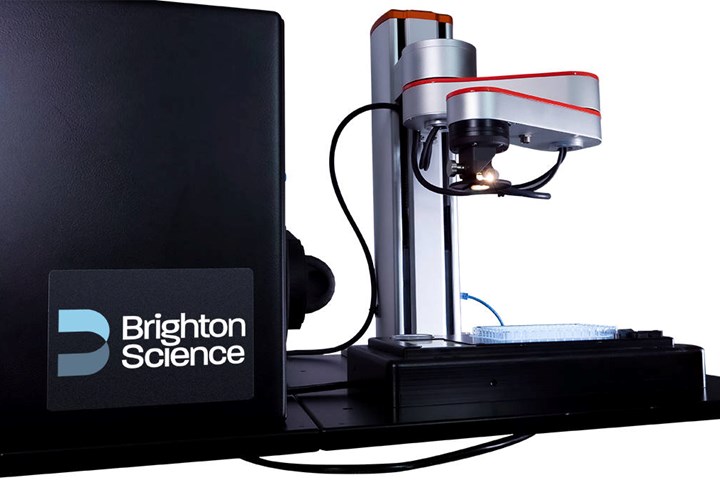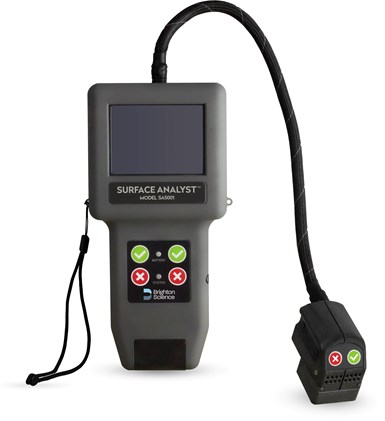
Brighton Science’s Automated Surface Analyst enables surface quality control for a variety of production processes.
Photo Credit: Brighton Science
Innovation comes in many forms and is not always based on a new product or technology, but instead on collaboration. Recently Hubbard-Hall (Waterbury, Conn.) and Brighton Science (Cincinnati, Ohio) announced such a partnership aimed at helping Hubbard-Hall expand its services and accelerate the speed at which customers can innovate. The two companies’ initiative, known as the Infinity Surface Cleaning Intelligence Program, combines Brighton Science’s technologies and materials science knowledge with Hubbard-Hall’s chemistry and cleaning knowledge.
The goal of the Infinity Surface Cleaning Intelligence Program is to solve, prevent, and control the variables and risks manufactures face when preparing surfaces for bonding and adhesion. The program is designed to ensure that critical cleaning processes are predictable, data-driven, and enable innovation to match customers’ ever-changing surface cleanliness needs.
“We want to help our customers use less chemistry,” says Molly Kellogg, Hubbard-Hall chairman, president and CEO. “By partnering with Brighton Science, we can use their technology to validate cleanliness and help our customers achieve better control and predictability around cleaning. The goal is to finally bring scientific control to high-value cleaning operations.”

Brighton Science Handheld Surface Analyst
Photo Credit: Brighton Science
Brighton Science designs high-precision instruments that bring unprecedented visibility to surfaces. The company’s flagship solution is a surface inspection device that allows manufacturers to rapidly quantify the quality of material surfaces after cleaning processes and before applications such as bonding, coating, sealing, painting or printing. The Surface analyst is available in handheld and automated designs and the company also offers custom solutions. Andrew Reeher, Chief Executive Officer at Brighton Science, explains how the company is partnering its expertise with Hubbard-Hall:
“What’s exciting about our relationship with Hubbard-Hall is the match between their technology and ours,” he says. “Many organizations are striving to improve the sustainability of their manufacturing processes. In response, Hubbard-Hall is offering a new aqueous alternative for cleaning that is far more environmentally friendly than traditional methods. But customers aren’t willing to sacrifice quality. That’s where our solution comes in.”
There are two versions of the program. The first is the Infinity Brighton Specification Package, a proactive solution meant for those who have yet to invest in a cleaning line. Brighton Science provides a set of cleaning specification parameters to be measured by its surface analyst technologies. With those parameters defined, customers have access to material science Ph.D.-level consultants to solve, prevent and control critical surface cleaning challenges, improve value engineering and optimize the cleaning process.
The second program version is the Infinity Optimizer Package, which focuses on optimizing and innovating an existing cleaning process through consultations with Hubbard-Hall and Brighton Science experts. The conversations center around value engineering and how it can positively affect a cleaning process and establish process specifications.
“Since our technology can estimate the surface energy of the part after cleaning, advisors from Hubbard-Hall are able to use our measurement system to demonstrate the efficacy of their solution,” Reeher says, “Hubbard-Hall can demonstrate the business fit and benefits, while our technology also creates ways for customers to control the performance of a more challenging process once they are in production.”
Hubbard-Hall | 855-405-6123 | hubbardhall.com
Brighton Science | 513-469-1800 | brighton-science.com
Related Content
AESF Heritage: The 2002 Hydrogen Embrittlement Seminar No. 4: Hydrogen Embrittlement – A Personal View
This is last of four papers presented during AESF Week 2002 at the Rosen Center in Orlando, Florida on January 30, 2002, as part of the Hydrogen Embrittlement Seminar. This paper presents a comprehensive overview of the research into hydrogen embrittlement at the turn of the century. The full paper on this work can be accessed and printed at short.pfonline.com/NASF24Sep4.
Read MoreOnline Energy Savings Calculator Promotes Energy Efficiency
An online energy savings calculator from AkzoNobel aims to help customers determine how to reduce energy usage.
Read MoreNASF/AESF Foundation Research Project #121: Development of a Sustainability Metrics System and a Technical Solution Method for Sustainable Metal Finishing - 15th Quarterly Report
This NASF-AESF Foundation research project report covers the twelfth quarter of project work (October-December 2023) at Wayne State University in Detroit. In this period, our main effort focused on the development of a set of Digital Twins (DTs) using the Physics-Informed Neural Network (PINN) technology with application on parts rinsing simulation.
Read MoreMastering Uniformity Through Surface Prep Standardization
By standardizing surface preparation processes and adopting surface energy measurement, a company can achieve uniformity, quality and cost reduction.
Read MoreRead Next
Education Bringing Cleaning to Machining
Debuting new speakers and cleaning technology content during this half-day workshop co-located with IMTS 2024.
Read MoreDelivering Increased Benefits to Greenhouse Films
Baystar's Borstar technology is helping customers deliver better, more reliable production methods to greenhouse agriculture.
Read MoreA ‘Clean’ Agenda Offers Unique Presentations in Chicago
The 2024 Parts Cleaning Conference, co-located with the International Manufacturing Technology Show, includes presentations by several speakers who are new to the conference and topics that have not been covered in past editions of this event.
Read More























